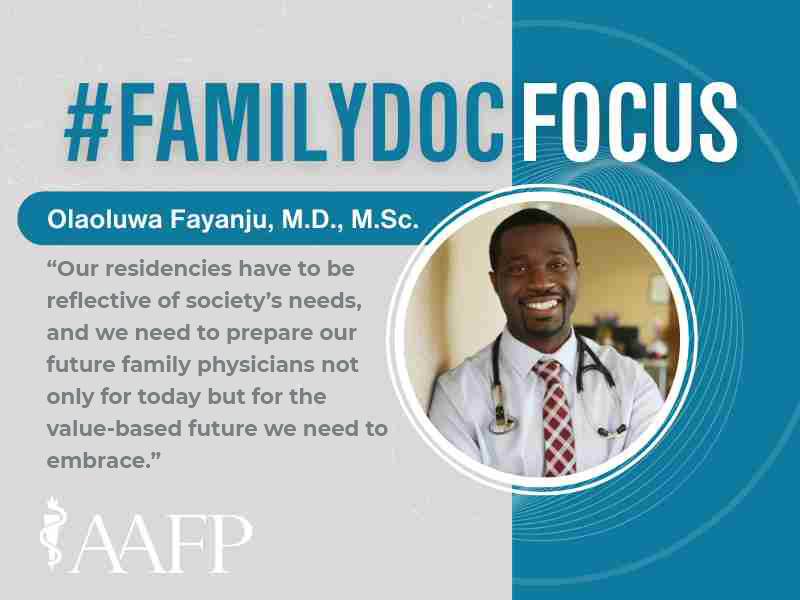RubiconMD CMO to Talk Innovation at Residency Leadership Summit
Feb. 15, 2023, David Mitchell — Olaoluwa Fayanju, M.D., M.Sc., was just three months old when his family first arrived in the United States from his native Nigeria. He was so small, he joked, that he could have counted as his mother’s carry-on item.

More than three decades later, Fayanju and his three siblings all work in U.S. health care.
“There are not many places in the world where our story is possible,” said Fayanju, chief medical officer of RubiconMD, which provides asynchronous electronic consults from subspecialists to primary care physicians. “I’m very grateful for all that I had access to growing up in New Jersey.”
That included “amazing teachers” who supported Fayanju and encouraged him to “take every chance provided to me with both hands.”
Fayanju earned his undergraduate degree in history from Harvard and spent two years working as a research analyst and consultant in the financial sector before returning to Harvard to earn a master’s degree in health policy and management. Medical school at Tufts University School of Medicine followed.
“Medicine was always the plan, even when I worked in financial services, but I also wanted to be sure of that plan,” said Fayanju. He was inspired by his grandmother, who was a nurse in Nigeria, and an aunt who is a pediatrician. “Service to others through medicine is deeply rooted in our family and is a fundamental value for me.”
Within a year of completing his training at the Cook County-Loyola-Provident Family Medicine Residency, Fayanju was serving as medical director of his clinic on the south side of Chicago. He later joined Oak Street Health, a network of primary care clinics that specializes in caring for seniors in more than 21 states.
He was senior medical director, and later regional medical director, when Oak Street expanded into Ohio with two clinics in 2018. The company’s Ohio footprint has grown to 11 clinics with 40 clinicians caring for more than 15,000 patients.
Fayanju was already a champion of using RubiconMD before Oak Street acquired it 2021. He became RubiconMD’s chief medical officer in December.
“I’ve been a very avid user and have worked with our Oak Street teams and with Rubicon to find ways to integrate that work into our care,” he said.
Through its network of subspecialists, RubiconMD aims to reduce unnecessary referrals and costs while increasing access to care.
“We’ve basically taken the concept of the curbside consult that has been a cornerstone of hospital and ambulatory medicine, and made it an integrated part of care using the technology of our platform,” Fayanju said.
That’s the type of innovation Fayanju will talk about during a mainstage presentation about preparing residents for the future during the 2023 Residency Leadership Summit, which will be held March 3-5 in Kansas City, Mo.
“Our residencies have to be reflective of society’s needs, and we need to prepare our future family physicians not only for today but for the value-based future we need to embrace,” he said.
That includes caring for an aging population. By 2030, it’s expected that 20% of the U.S. population will be older than age 65.
“The graying of America, or the silver tsunami, is real,” Fayanju said. “It will be one of the dominant demographic stories of a graduating resident’s career. We have to think about dealing with ever greater complexity in the primary care setting.”
Fayanju spends the majority of his time in his new role as CMO, but he continues to see patients at least one day a week.
“I could not and would not want to step fully away from taking care of patients,” he said. “I think it’s too important that we be informed about the decisions we make as leaders and executives. As medical leaders, we have to have our figurative pulse on the ways in which our colleagues practice and the ways in which our patients experience care.”
Black men account for less than 3% of the U.S. physician workforce. Fayanju, who has served as a member of the White House’s Health Equity Roundtable, is a guest lecturer at Case Western Reserve’s Weatherhead School of Management and in Harvard’s schools of government, medicine and public health. He relishes opportunities to mentor future physicians and leaders.
“Just as there are many barriers and roadblocks to getting good health care in the United States, there are also a lot of barriers and roadblocks to becoming a physician,” he said. “Those barriers are quite a bit steeper and quite a bit harder to scale if you’re a Black American. I recognize that I am privileged, and I have a responsibility to encourage the next generation. I tell them the road ahead is long, but it’s worth it.”